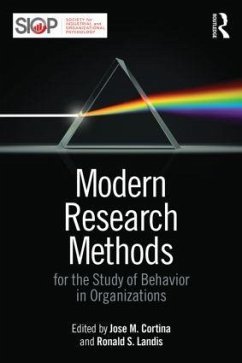
Reflective and Impulsive Determinants of Human Behavior
Versandkostenfrei!
Versandfertig in 1-2 Wochen
71,99 €
inkl. MwSt.

PAYBACK Punkte
36 °P sammeln!
Conflicts between the "head" and the "heart" are very common in everyday life. Over the past decade, research on such self-regulatory conflicts has been strongly shaped by Strack and Deutsch's 2004 Reflective-Impulsive Model (RIM). The award-winning theory integrates cognitive, affective, and motivational influences on overt behavior, offering a domain-independent framework that is applicable to wide range of social and non-social phenomena. This book provides a state-of-the-art overview of research under the framework of the RIM. Its 15 chapters provide an overview of basic principles of beha...
Conflicts between the "head" and the "heart" are very common in everyday life. Over the past decade, research on such self-regulatory conflicts has been strongly shaped by Strack and Deutsch's 2004 Reflective-Impulsive Model (RIM). The award-winning theory integrates cognitive, affective, and motivational influences on overt behavior, offering a domain-independent framework that is applicable to wide range of social and non-social phenomena. This book provides a state-of-the-art overview of research under the framework of the RIM. Its 15 chapters provide an overview of basic principles of behavior determination, showcase the RIM's integrative and predictive power in many cross-cutting areas of inquiry, and illustrate the value of the theory for understanding the fundamental role of reflective and impulsive processes in various applied domains. Expanding on an introduction that discusses the significance of the RIM from a historical view, the book is divided into three major sections. The first section covers basic psychological principles within the RIM, including selective accessibility, embodiment, associative and propositional operations, and implementation intentions. The second section reviews the integrative and predictive power of the RIM in many cross-cutting areas of inquiry, including intuition, attitudes, self-control, and personality. Finally, the third section showcases the generative power of the RIM in various applied areas, including research on health behavior, addiction, anxiety, economic behavior, sexual behavior, and aggression. In its entirety, this volume provides an indispensable resource for any scholar interested in the psychological underpinnings of reflective and impulsive behavior in various areas of inquiry.














